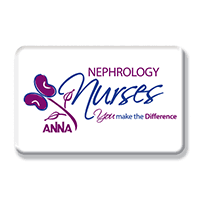
Recognizing Nurses During National Nurses Week
As National Nurses Week 2020 is recognized this week, nurses around the world are finding themselves and the work they do on the frontlines of a global COVID-19 pandemic.
The acute respiratory virus impacts patients’ lungs with ferocity, but other organs and body systems are also vulnerable to the effects of the disease.
Lillian Pryor, MSN, RN, CNN, president of the American Nephrology Nurses Association (ANNA), says patients are also suffering from declines in kidney function, and nephrology nurses are an active part of many care teams during this emergency. Pryor notes that acute kidney injury (AKI) is showing up in patients who had normal functions before and that pre-COVID AKI cases requiring dialysis are increasing.
ANNA recently launched a Nephrology Nurse Surge Support tool to help meet the growing need of these specialized nurses as the country copes with hot spots of cases. “This was designed to help connect providers and nurses in those hot spot areas as we saw an increase in patients experiencing kidney related complications and needing some type of renal replacement therapy,” she says. The tool helps identify the areas that need these skills and then match with the nurses who can provide the help. Nephrology nurses are called upon to perform hemodialysis, continuous renal replacement therapies and peritoneal dialysis treatments needed, says Pryor. “At the same time,” she says, “our acute nurses are also helping to provide that optimal critical management piece that is necessary to support these patients—helping to maintain euvolemia and astute assessment skills.”
The specialty is particularly rewarding to Pryor. “Nephrology nursing allows so many avenues to practice,” she says. “From pediatrics to gerontological, to acute, to chronic, transplant, pre-ESKD—it involves the total patient across the lifespan. There’s just so much – and there’s probably something in nephrology nursing that would interest everyone,” she says.
Pryor says she became interested in the field almost immediately after passing the NCLEX. “I was working in a small community hospital in New Jersey and was floated to a unit that was dedicated for caring for HIV+ patients,” she says. “One of the patients I was assigned to had to have dialysis treatment. I was so intrigued because I had never seen the treatment performed, and I was hooked after that.”
Nephrology nurses have many choices within the specialty, says Pryor, and that means the career offers opportunities. “You bond with patients and their families,” she says. “You can see your efforts as the patient gets better, and sometimes you are able to educate and actually prolong the time the patients may need before renal replacement therapy.”
As a self-described teacher at heart, Pryor says education plays a big role in nephrology nursing. “You also have so many opportunities for education and training.” Being able to educate patients and their families about their conditions, treatments, and even prevention can make a huge impact, she says, even potentially delaying disease progression in some cases. And when patients are close to the end of life, the education continues. “We have the opportunity to be there for them and answer questions,” she says. “We allow them to prepare for how they can live their best life until the end.”
Looking ahead to after the current crisis, Pryor says she does see changes that will be positive and hopeful and some that will impact the entire nursing industry. “We would actually like to see more of what we’ve been seeing,” she says. “There’s been a focus on education and on different ways of administering the treatments. We’re thinking of every possible way of renal replacement treatments in centers and in homes.” Pryor is also hopeful that the current necessitated boon in telehealth and virtual appointments might continue. She finds the platform actually helps some patients and makes them feel more comfortable reaching out to their healthcare teams.
Especially during National Nurses Week, Pryor is proud of her profession. “I want to wish my colleagues a happy Nurses Week,” says Pryor. “I recognize all of my colleagues for their compassion, commitment, and courage. I couldn’t be more proud of them.”



